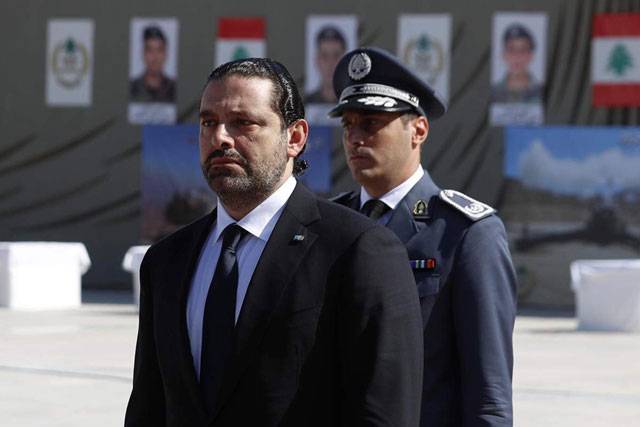RIYADH - Lebanese Prime Minister Saad Hariri said Thursday he would travel to France “very soon” from Saudi Arabia, which rejected accusations the premier was detained in Riyadh following his shock resignation.
Hariri, who has been in the Saudi capital since announcing there on November 4 that he was stepping down, met with visiting French Foreign Minister Jean-Yves Le Drian, who said the Lebanese premier had accepted an invitation to Paris.
Earlier Le Drian held talks with his Saudi counterpart Adel al-Jubeir who told reporters that Hariri, a dual Saudi citizen whose family is a longtime ally of the kingdom, was free to leave “when he pleases”.
Jubeir is the highest-ranking Saudi official to comment on Hariri’s status since his surprise resignation when he accused Saudi Arabia’s arch-rival Iran and its Lebanese ally Hezbollah of destabilising his country and said he feared for his life.
Hariri is living in the kingdom “of his own free will,” Jubeir said.
“These are false allegations. The accusation that Saudi Arabia is detaining a prime minister, and particularly a political figure who is an ally... is untrue,” he added.
Lebanese leader Saad Hariri will arrive in France on Saturday and meet President Emmanuel Macron at the Elysee Palace, the French presidency said Thursday.
Hariri is travelling to France at the invitation of the French government in a move that diplomats hope will ease regional tensions.
Lebanese PM Saad Hariri’s decision to accept an invitation to Paris is the “start of a solution” to the crisis sparked by his resignation in Saudi Arabia, Lebanon’s president said Thursday.
“We hope that the crisis is over and Hariri’s acceptance of the invitation to go to France is the start of a solution,” Aoun said on the official presidential Twitter account.
“I am awaiting the return of Prime Minister Hariri from Paris for us to decide the next step with regards to the government,” Aoun added.
Lebanese President Michel Aoun, who this week accused Saudi authorities of “detaining” Hariri and refused to accept his resignation from abroad, welcomed the news that the premier would visit Paris for talks with President Emmanuel Macron.
“We hope that the crisis is over and Hariri’s acceptance of the invitation to go to France is the start of a solution,” he said on the official presidential Twitter account.
“If Mr. Hariri speaks from France, I would consider that he speaks freely, but his resignation must be presented in Lebanon, and he will have to remain there until the formation of the new government,” Aoun said later in a statement issued by the presidency.
- France visit ‘not exile’ -
Le Drian’s visit is the latest in a string of European efforts to defuse the rising tension over Lebanon, which has long been riven by disagreements between Hariri’s bloc and that of his chief rival, Hezbollah.
“He (Hariri) will come to France and the prince has been informed,” Le Drian told reporters, referring to Saudi Crown Prince Mohammed Bin Salman with whom he held talks the night before.
Hariri, asked after meeting with Le Drian when he would visit France, did not specify a date but said “very soon”.
The French president’s office on Wednesday had confirmed that Hariri and his family had been invited to France for a “few days” but that did not mean he would stay there in exile.
Macron has stressed that Hariri should be able to return to Lebanon to confirm or withdraw his resignation in person.
- Common stance on Iran -
Hariri’s resignation came against the backdrop of mounting tensions between Saudi Arabia and Iran, which back opposing sides in regional conflicts in countries including Syria and Yemen.
Many observers saw his stepping down as a power play between Riyadh and Tehran.
Speaking at the news conference, Jubeir denounced Hezbollah as “a tool of the Iranian Revolutionary Guards” and “a first-class terrorist organisation used by Iran to destabilise Lebanon and the region”.
Le Drian said he was also concerned over Iranian “intervention in regional crises” and “hegemonic” intentions.
“I’m thinking specifically about Iran’s ballistic programme,” Le Drian added.
France has however sought to maintain a nuanced position in the region.
Macron, on his first state visit to the Middle East last week, called for vigilance towards Tehran over its ballistic missile programme and regional activities.
But the president also cautioned against creating a “new front” in a region already fraught with conflicts, including the war in Yemen.
The Arab League is to hold an extraordinary meeting next Sunday at the request of Saudi Arabia to discuss alleged “violations” committed by Iran in the region.






